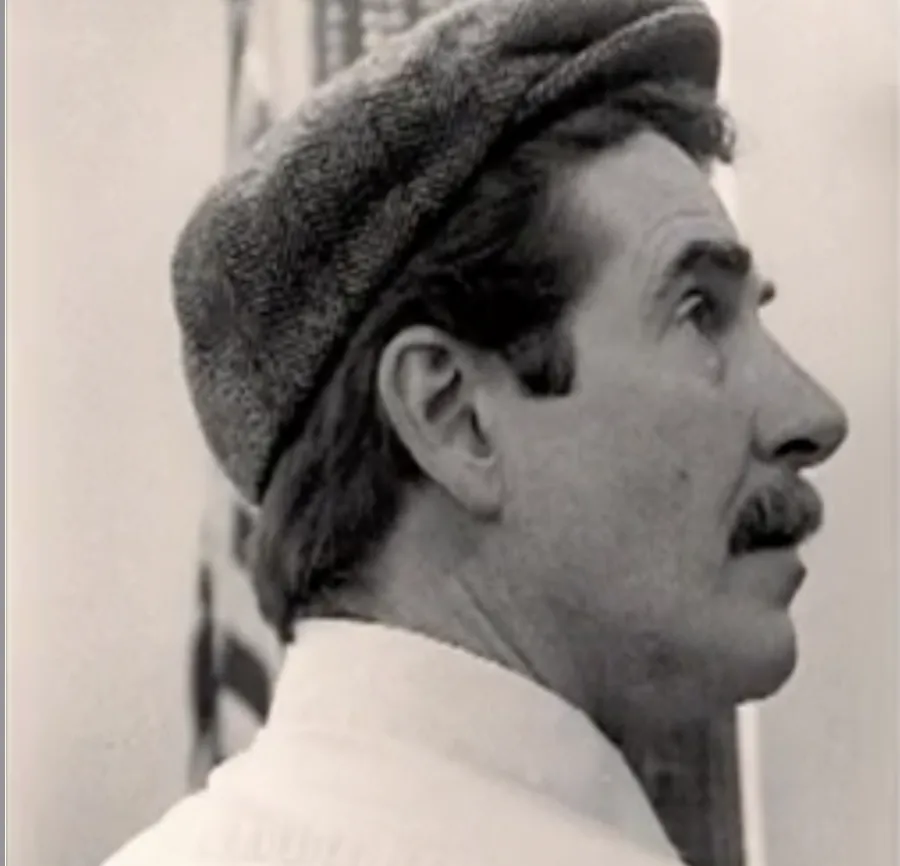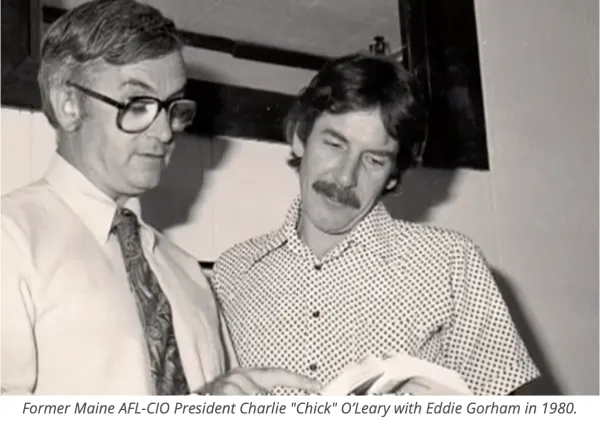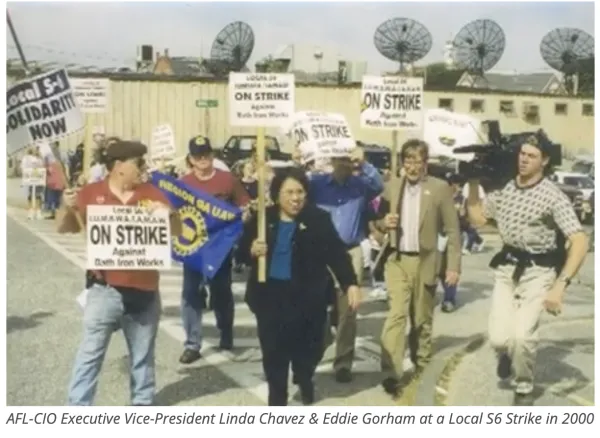Brother Eddie Gorham, Fighter for Workers’ Rights, Economic Justice & Equality Leaves Lasting Legacy in Maine

Our hearts are heavy with the news that former Maine AFL-CIO President Eddie Gorham (Boilermakers Local 29) has passed away following a decade-long battle with Parkinson’s disease. Brother Gorham passed on at home holding hands with his family on September 27, 2022, according to his obituary. He was 78.
Born on March 8, 1944, Eddie Gorham grew up in the Munjoy Hill neighborhood of Portland and earned a degree in history and government from the University of Maine at Portland (now USM) in 1966. After serving two years in the Peace Corps in the Punjab region of India, Gorham joined Local 29 of the International Brotherhood of Boilermakers, Iron Shipbuilders, Blacksmiths, Forgers and Helpers and became a journeyman boilermaker for life.
Retired Local 29 member Jimmy McHugh who worked alongside Gorham at many jobs in the 1970s remembers Gorham as “a wonderful guy and true brother Boilermaker.” With his long hair, Gorham stood out on the crew and was known for his strong opinions about fairness and equality. He could tell a joke, was an encyclopedia of labor history and McHugh always gravitated toward him on the worksite.
"He was a really great guy, a family man and a great welder," recalled McHugh. "He would hang out and joke around with the guys, but he wasn't afraid to speak up on the job when he saw something wrong. Not everyone does that when you work in construction because you can end up on the lay-off list, but he wasn’t afraid to do it."
In those days the public was becoming aware about the deadly effects of asbestos exposure and Gorham was outspoken about the need for proper protections. He would go on to prioritize protecting workers from asbestos exposure at the Maine AFL-CIO in the 80s. McHugh recalled how common racial discrimination was in the Building Trades and how Gorham was fearless in his criticism of the union for having only three Black members and no women.
"Back then you had to know someone or have a family member in the building trades to get into a union and they kept women and minorities out, said McHugh. "Eddie spoke up about that, but the situation didn't change until federal laws were changed and several lawsuits were filed against the union. Our local alone spent $3 million alone on discrimination lawsuits."
Black members often experienced racism and even occasional violence on newly integrated job sites. When the City of Boston required a percentage of minority workers on publicly funded construction projects, some white union members started inaccurately referring to the Black workers as "scabs." McHugh remembers a clique of white Boilermakers cutting a rung on a ladder so one of the Black workers fell off while climbing down from a scaffold and broke his ankle. He ended up walking away with a $500,000 settlement from the union. To speak out about racism in such a volatile environment took courage.
In 1976, Gorham volunteered for the Maine AFL-CIO. At the time, labor leader Ben Dorsky was the president, having served in the role — first as President of Maine State Federation of Labor and then the Maine AFL-CIO — since the 1930s.
"Sit down you punk,” Gorham remembered Dorsky telling him. “We're going to start your education.” The most memorable advice Gorham remembered was to "sit down and listen to people of differing opinions and not assume you were right." The veteran labor leader also told Gorham to lose the pony tail and blue jeans.
McHugh remembered how proud Gorham’s Local 29 brothers were when he was elected the Secretary Treasurer of the Maine AFL-CIO in 1979. In 1999, he was elected Maine AFL-CIO President and served in the position until his retirement in 2010. He was also one of the founding members and longtime Vice Chair of Maine Labor Group on Health, which launched in 1977 to address workplace health and safety and health care issues such as the cost of health insurance.
“Eddie was a master of the Legislative process and had an extensive knowledge of history. A true champion for all workers,” said retired Professional Firefighters of Maine President Bob Duplessie, a former legislator and Maine AFL-CIO executive board member. “He would never show that he was ever mad at legislators because he knew he might someday need them.”
Duplessie vividly remembers being with Gorham during the bitter strikes at the Rumford mill in 1986 and the Jay paper mill in 1987, shouting “Scabs Out! Union In!”

The late 20th and early 21st century were difficult years for the labor movement as factories closed, union jobs were shipped overseas and a anti-union political environment gave employers the upper hand in strikes and union drives. Nevertheless, Gorham remained undaunted and constantly optimistic in the face of every challenge, recalled former Maine AFL-CIO Secretary-Treasurer Ned McCann.
"'We’ve dealt with their kind before. And we will again,' he’d reassure me," said McCann. "Eddie understood that the struggle would always continue. His foundational faith in the collective strength of ordinary working people was his touchstone... He was a great teacher, mentor, friend; a wonderful big brother. I am truly blessed by the experience of knowing Eddie Gorham."
McCann recalled one time after a corporate lobbying effort derailed a bill that would ban random, mandatory drug testing, Gorham expressed his frustration to a group of Madawaska papermakers.
“If they tell you to pee in a cup, tell them to go shit in their hat!” said Gorham.
"The bill finally enacted was watered down considerably, but Eddie had not given up," said McCann. "'We’ll get them in rulemaking,' Eddie said. And he did. So, while drug testing is allowed in Maine, the process is so cumbersome, so expensive, and so difficult-with workers’ due process rights fully enshrined in the law-that relatively few employers utilize it. Eddie was resourceful, and determined."
Christine Hastedt, a longtime advocate for low-income Mainers, met Gorham in the late '70s after he had put his tools aside to work for the Maine AFL-CIO. The economy had recently recovered from a deep recession, but the state’s unemployment trust had been drained due to so many Maine workers losing their jobs. Businesses protested as employer taxes rose to replenish the trust. As a result, Hastedt recalled, “a serious political assault on worker’s benefits was brewing." She remembered Gorham with his ponytail and blue jeans as the two headed to testify to the Labor Committee.
“We had saved much, lost some, and even made some modest gains,” recalled Hastedt in a speech at Gorham's retirement party in 2010. “But the most important lesson that I learned that first year was just how much I could trust Eddie and the AFL for their rock solid, fundamental commitment to Maine workers that has never faltered to this day.”
For over three decades, Gorham helped lead the fight for severance pay, the minimum wage, protections from toxic chemicals, prevailing wages, anti-sexual harassment legislation, training benefits and unemployment. He was constantly on guard against efforts to weaken and undermine our unions and successfully beat back anti-union legislation like so-called “right to work” bills.
Hastedt said he also played a quiet, but major role in protecting aid for the poorest children in the state, and expanding the right to unemployment benefits for part-time workers and victims of domestic violence. Gorham was on the frontlines of the fight to guarantee health care for all people, regardless of whether they enjoy union health benefits. He was an early advocate for gay rights and brought forward a resolution endorsing human rights protections for gay and lesbian people twenty years before the measure was passed into state law. Hastedt called Gorham the “real soul of the labor movement.”
"The most important thing about Eddie, though, was his kindness," wrote McCann. "Eddie loved working people, he loved local unions, he loved Maine, and he loved the labor movement. More than anything, he loved his beautiful family—deeply, relentlessly, unconditionally. It was a joy to observe. The labor movement in Maine has lost a giant. Eddie would no doubt reject that characterization, one of the few times he would be wrong. Rest in peace."

When asked one time what he did for work, Gorham quipped, "Comfort the afflicted and afflict the comfortable.”
We can’t think of a better way to sum up Brother Gorham’s life and are hearts are with his wife Diana and their family.
His family has opted not to host a funeral, but “wishes to thank everyone who attended Eddie's retirement party in 2010 where he was beautifully honored by the Maine workers whose lives he touched and where he was able to celebrate a life well lived with the people who loved him most.”
In lieu of a funeral the family is inviting anyone who crossed paths with Eddie to please share their remembrances of him by visiting https://bit.ly/RememberingEddie and submitting a story of your time with him, a quote that he shared with you or a picture of your time together. Condolences may be expressed at www.funeralalternatives.net
